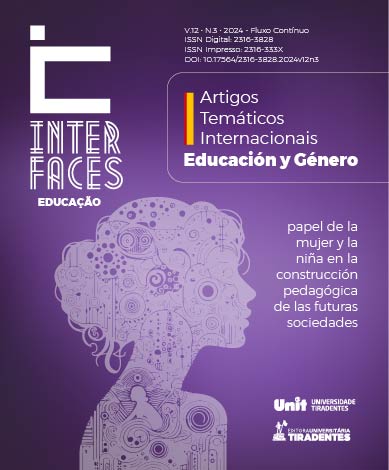The Social Cognitive Theory of Albert Bandura
Core Characteristics and Implications for Education
DOI:
https://doi.org/10.17564/2316-3828.2025v13n1p206-219Keywords:
Social Cognitive Theory, Learning theories, Basic EducationPublished
Downloads
Downloads
Issue
Section
License
Copyright (c) 2025 Interfaces Científicas - Educação

This work is licensed under a Creative Commons Attribution-NonCommercial 4.0 International License.
A Revista oferece acesso livre e imediato ao seu conteúdo, seguindo o princípio de que disponibilizar gratuitamente o conhecimento científico contribui para a democratização do saber. Assume-se que, ao submeter um artigo, o(a) autor(a) se reconhece como detentor(a) do direito autoral sobre ele e autoriza seu livre uso pelos leitores, podendo ser, além de lido, baixado, copiado, distribuído e impresso.Abstract
This study aimed to conduct a literature review on Albert Bandura’s Social Cognitive Theory (SCT) and its implications for improving teaching and learning processes.
Given the significant relevance of Bandura's theory in the fields of psychology and education, the main concepts of SCT were addressed: observational learning, modeling, self-regulation, self-efficacy, and triadic reciprocity. These concepts provide a better understanding of the influences of the environment, stimuli, and cognitive processes on enhancing the educational process. Through this analysis, it is concluded that SCT serves as an important theoretical framework for educators, enabling a deeper understanding of the dynamics of the teaching-learning process and offering a solid foundation for improved performance in their roles, within a perspective of education aimed at social transformation.
How to Cite
References
ALMEIDA, Alana Peixoto de et al. Comparação entre as teorias da aprendizagem de Skinner e Bandura. Caderno de Graduação-Ciências Biológicas e da Saúde-UNIT-ALAGOAS, v. 1, n. 3, p. 81-90, 2013. Disponível em: https://periodicos.set.edu.br/fitsbiosaude/article/view/905. Acesso em 03 abr. 2023.
AZEVEDO, Mário. A teoria cognitiva social de Albert Bandura. Universidade de Lisboa, Faculdade de Ciências, Lisboa, 1997. Disponível em: https://webpages.ciencias.ulisboa.pt/~mdazevedo/materiais/ME&TES/Aprendiz02CognitSocial.pdf. Acesso em 18 mar. 2023.
BANDURA, Albert; AZZI, Roberta Gurgel; POLYDORO, Soely Aparecida. Teoria social cognitiva: conceitos básicos. Porto Alegre: Artmed, 2008, p. 15-41
BANDURA, Albert. Fearful expectations and avoidant actions as coeffects of perceived self-inefficacy. 1986.
BANDURA, Albert. Self-efficacy: toward a unifying theory of behavioral change. Psychological review, v. 84, n. 2, p. 191, 1977.
BARROS, Marizeth; BATISTA-DOS-SANTOS, Ana Cristina. Por dentro da autoeficácia: um estudo sobre seus fundamentos teóricos, suas fontes e conceitos correlatos. Revista Espaço Acadêmico, v. 10, n. 112, p. 1-9, 2010. Disponível em: https://periodicos.uem.br/ojs/index.php/EspacoAcademico/article/download/10818/5961/0. Acesso em: 03 abr. 2023.
BENDER, W. N. Aprendizagem baseada em projetos: educação diferenciada para o
século XXI. Penso Editora, 2015.
PEREIRA, Carlos Alexandre Rodrigues et al. Suporte ao ensino remoto: metodologias ativas de aprendizagem e avaliação formativa. Rio de Janeiro: UFRJ, Núcleo Interdisciplinar para o Desenvolvimento Social, 2020. Disponível em: https://pantheon.ufrj.br/handle/11422/12914. Acesso em 16 mar. 2023.
CASIRAGHI, Bruna; BORUCHOVITCH, Evely; ALMEIDA, Leandro S. Crenças de autoeficácia, estratégias de aprendizagem e o sucesso acadêmico no Ensino Superior. Revista E-psi, v. 9, n. 1, p. 27-38, 2020. Disponível em: https://repositorio.unicamp.br/Busca/Download?codigoArquivo=522763. Acesso em 10 abr. 2023.
FARIAS, Luciano Santos. Albert Bandura e o ensino de ciências na educação de jovens e adultos. Scientia Naturalis, v. 1, n. 5, 2019. Disponível em: https://periodicos.ufac.br/index.php/SciNat/article/view/3017. Acesso em: 01 Abr. 2023.
FREITAS, Sandra Ferreira; GODOI, Christiane Kleinübing. A aprendizagem organizacional sob a perspectiva sócio-cognitiva: contribuições de Lewin, Bandura e Giddens. Revista de Negócios, v. 13, n. 4, p. 40-55, 2009. Disponível em: https://bu.furb.br/ojs/index.php/rn/article/view/747. Acesso em 13 abr. 2023.
LABS, Alva Valéria Moro; GIMILIANI, Tiago Escame. LEARNING BY OBSERVATION MAY ARISE AS A SIGNIFICANT LEARNING STRATEGY FOR STUDENTS WITH DIFFICULTIES IN THE EARLY GRADES OF ELEMENTARY SCHOOL. Revista Gênero e Interdisciplinaridade, v. 3, n. 03, p. 102-111, 2022. Disponível em: https://www.periodicojs.com.br/index.php/gei/article/view/818/649. Acesso em 10 abr. 2023.
LUCKESI, Cipriano Carlos. Proposições. Avaliação da Aprendizagem Escolar: Estudos e Proposições. São Paulo: Cortez, 2011.
MELO-DIAS, Carlos; SILVA, CF da. Teoria da aprendizagem social de Bandura na formação de habilidades de conversação. Psicologia, Saúde & Doenças, v. 20, n. 1, p. 101-113, 2019. Disponível em: https://pdfs.semanticscholar.org/6c6b/b3d825648cf83dcadfdeaea359f7b8718985.pdf. Acesso em 28 de mar. 2023.
SCHULTZ, Duane P. & SCHULTZ, Sydney Ellen. História da psicologia moderna. 9ª edição. Cengage Learning, 2011.
SCHULTZ, Duane P.; SCHULTZ, Sydney Ellen. Teorias da personalidade. 3ª edição. Cengage Learning, 2015.
TORISU, Edmilson Minoru. FERREIRA, Ana Cristina. A teoria social cognitiva e o ensino-aprendizagem da matemática: considerações sobre as crenças de auto-eficácia matemática. Ciências & cognição, v. 14, n. 3, p. 168-177, 2009. Disponível em: https://cienciasecognicao.org/revista/index.php/cec/article/view/106/150. Acesso em 20 mar. 2023.


















